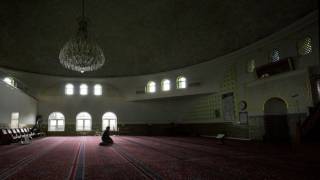Darren Osborne and the Finsbury Mosque Incident
A Rebellion Against the Idea that Revenge Couldn’t even be Contemplated
At time of this writing, the Left and the British state are busily engaged in portraying a solitary, frustrated, drunken son of Albion as that great figure of myth — the ‘right wing extremist.’ By most accounts Darren Osborne is an everyman figure, a married father of four who enjoys his beer and the quiet life of the suburban lower middle class. In images displayed by the media, green weeds split the ground just outside his otherwise tidy home, while a police officer stands at the gate of a small, neat, garden fence. It’s the kind of home you’d walk past and not look at twice; a home like your own. Like a lot of men his age, Osborne appears to have grumbled occasionally at ‘the Muslims,’ and bristled at the growing number of Islamic terrorist attacks occurring in his nation. But there was nothing to suggest he might be a ‘man of action.’ He was not a member of any nationalist organization. He had no blog, no history of activism. The leader of the South Wales National Front, Adam Lloyd, told the press that Osborne “is not known to any of us here in South Wales National Front, and to our knowledge is not and never has been a member.” Darren Osborne surprised ‘the movement’ with his actions in Finsbury, though I suspect he surprised himself even more.
Modern ‘society’ is expert at controlling the behavior of men — in particular, the expectations, responsibilities, and burdens of the consumer society, propped up by mortgage and credit card usury. Shackled from cradle to grave. For many people, leaving education is merely the start of a succession of races to pay the bills each month. No grander purpose or vision lies beyond this bottom line. A wife may come and go, homes are bought and debts incurred, children are born in order that they too might one day begin the same race.
Some might say that this has always been the case, and in some respects they are correct. However, the last five decades have witnessed the steady politicization of the working environment, and this is unique. Being socially and politically compliant became a more important part of life than at any time in history. In the past, there always existed ‘the frontier’ or beyond. There was thus always a place to go for ‘the man with a cause,’ the noble outlaw. The Icelandic Sagas, which in many respects exalt this type of man, are replete with individuals and individualism — tales of people who wanted more from life than existing social systems offered, and so set forth into new lands or waged war on the status quo in old ones.
The globalized world of the 21st century offers no frontier. Nowhere is free of the airport, the convenience store, the security camera, the detective, or the State. The world, as they say, is getting smaller, not bigger. Only the born slave could see this as a good thing. Today, there is no place for rebellion to be displaced to, and the State maintains a greater monopoly on the use of force than at any time in history. In this context, conformity has become endemic. Rebellion of even the most mediocre kind now results in ejection from employment and disaster in the race to pay those all-important bills. Loss of job can result in loss of home, and in many cases family. At some point in recent times, a man’s ability to conform and remain silent became the fulcrum upon which his entire personal fate would rest. And because of this, the vast majority of men remain silent and still when it comes to anything meaningful. Robinson Jeffers, the great ‘inhumanist’ poet of the early 20th century wrote of this malaise in ‘Decaying Lambskins’:
Because we are not proud but wearily ashamed of this peak of
time. What is noble in us, to kindle
The imagination of a future age? We shall seem a race of cheap
Fausts, vulgar magicians.
What men have we to show them? but inventions and appliances.
Not men but populations, mass-men; not life
But amusements; not health but medicines.
Read the rest of Andrew Joyce's article at The Occidental Observer.






















